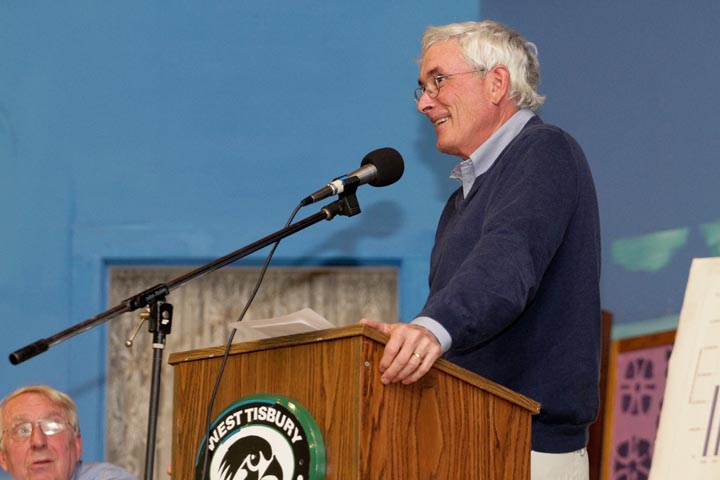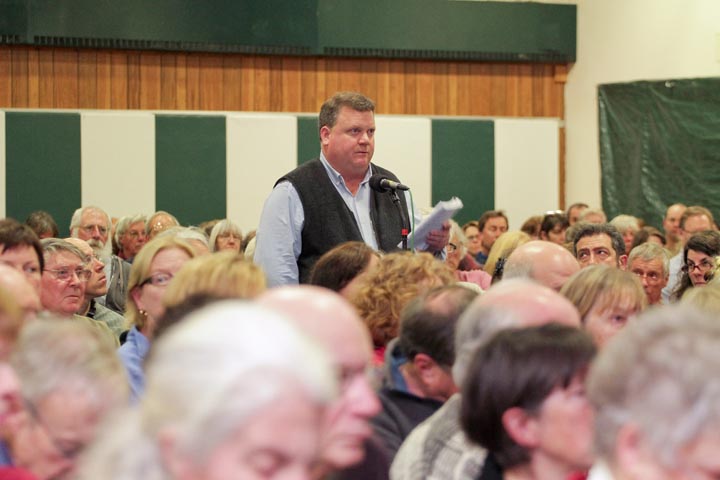There was debate and also compromise at the West Tisbury annual town meeting Tuesday night, where a record turnout of voters overwhelmingly backed a new town library and a dredging plan for the Mill Pond, and found a middle ground on paving town roads and allowing dogs on Lambert’s Cove Beach.
Three hundred and seventy-eight voters packed the elementary school gymnasium for the four-hour session, presided over by moderator F. Patrick Gregory.
Striking down a previous ban adopted at a special town meeting last year, voters agreed to once again allow dogs on Lambert’s Cove Beach during the summer months, from 7 a.m. to 10 a.m. The change was put into place after a new volunteer group, Friends of Lambert’s Cove Beach, moved to have the article split into two questions involving mornings and nights. Both questions called for the ban to be rescinded, and have the group hire a monitor to patrol for dog waste and misbehaved dogs.
Voters approved the morning measure 106 to 97, but the evening hours question was defeated by voice vote.
The parks and recreation committee defended the previous ban. “We understand there are people who were really happy when this was put in place,” said committee member Cheryl Lowe. “We’re trying to do this . . . so people who want to walk their dogs still can nine months of the year and people who want to go to a clean and pristine beach with their children still can,” she said.
Town animal control officer Joan Jenkinson also spoke in favor of the ban, though only took the floor for the second half of the vote.
“I feel Lambert’s Cove Beach is for people who pay good money — it is not a dog park,” Mrs. Jenkinson said. “The people who like to go to the beach, have glass of wine, watch the sunset should be able to do so without the disturbance of dogs . . . not everybody picks up after their dogs . . . and it becomes a public safety issue, which is part of my job.”
“I have to say I am in favor of the department of parks and recreation, and in honor of them I say no dogs on beach for three months of the year during the summer,” she said.
But others, including Marilyn Putney, spoke in favor of lifting the ban.
“Most important to me is my daughter’s welfare. She has a very demanding job and she travels all over the world . . . and it’s very important for her when she’s home to be able to walk the dogs on the beach in the morning usually,” she said.
Caryn Broitman argued for finding common ground.
“The experience of walking dogs with other people on the beach has been a really important connection for many members of the town,” she said. “I think issues need to be managed and need to be shared . . . I honor both people’s experiences. Even though I’d love to have dogs on the beach, I am perfectly willing to vote no to evening hours.”
The voters agreed, and restricted dogs to the morning hours.
Even with the affirmative vote, the selectmen said at their weekly meeting on Wednesday that questions remain.
“With this organization [Friends of Lambert’s Cove Beach], how are they going to bring forth the promises they made last night?” selectman and chairman of the board Jeffrey (Skipper) Manter 3rd said. Mr. Manter voted in favor of the new walking hours.
“What authority does this voluntary organization have to do anything?” asked selectman Richard Knabel, who voted against the measure. “I don’t see this as any real difference over what we’ve had and we know it doesn’t work. I hate to be a pessimist but I have a feeling it’s not going to work . . . it appears to be a recipe for more of the same.”
Selectmen have tentatively scheduled a public forum for April 25 at 5:30 p.m. at the Howes House with the group, the parks and recreation department, the police department, the animal control officer and the board of health to outline the responsibilities of the group and how the monitoring will occur.
Prior to the dog article, voters faced a slew of other business, including approving the town’s $14.4 million operating budget, up 4.5 per cent from last year, and a 2.5 per cent adjusted cost of living increase for town employees.
Voters readily approved the $1.5 million library expansion article, the final funding piece for the long-awaited $6 million building project. The money will be added to a $3 million state grant and some $1.5 million in private fundraising. Construction on the new 13,000 square foot library is set to begin in the fall.
“This is the moment of truth for this project,” said library trustee Dan Waters, who has helped lead the effort to raise private funds and apply for state grant money for the project.
A sea of hands went up when Mr. Gregory called for a vote after scant discussion, and the article passed 326 to 6. A burst of cheers rang out around the room.
After much debate over the state of Mill Pond and its future, voters agreed to allow the town to explore grant options to dredge the shallow pond, with an amendment that requires another town meeting vote to approve to accept any grant monies.
Not everyone was in favor of the move, and engineer Kent Healy argued for more research on the flow of the water before pursuing grant funding.
“If [the town] wants to preserve the Mill Pond they better pay attention where the water comes from and where it drains out of the pond before they start making plans,” he said.
Prudence Bert, who has advocated for alternatives to dredging, made the motion for the amendment. Chairman of the Mill Pond Committee Bob Woodruff said while the committee is in favor of pursuing dredging options, he supported returning to the town before any decision was made.
“I can’t even conceive of any committee in the commonwealth of Massachusetts . . . getting approval for a grant or receiving a grant without town meeting approval,” he said. “This is the last bastion of democracy in this room. I heartily endorse Prudy’s amendment if that is something that is important to people,” he said.
Voters also agreed to spend $2.3 million to repave town roads, a trimmer number than originally presented, although that article hinged on a corresponding ballot question Thursday night. Town highway superintendent Richard Olson defended the need to pave nearly all of the roads in town and the request to borrow the full $2.6 million on seven miles of road.
“Seven years ago we borrowed $1.1 million, we did half of the roads. Since that time . . . we’ve talked about setting money aside every year so we could accumulate money to pave the roads — that has never happened,” he said. “The roads are in disrepair and we need to do the work.”
But some residents of those roads, including New Lane and Old Courthouse Road, said they did not see the need to repave.
Resident of Old Courthouse Road Jason Napior made the motion to reduce the funding request by $242,000 by eliminating that road from the list.
“There are 12 families that live on that road and not one open pothole . . . there’s no reason to spend $250,000 to repave that road,” he said.
Voters amended down the article and approved borrowing $2.3 million to pave all or parts of New Lane, Lambert’s Cove Road, Tiah’s Cove Road, Indian Hill Road, Scotchman Bridge Lane, Old County Road and Middle Road.
As 10:15 p.m. approached with only half the 41 articles acted on, readings of the articles were waived to move the meeting along.
“I just saw someone fall asleep, and he still voted,” Mr. Gregory said before proceeding through the remainder of the warrant.
Voters approved spending $400,000 for a new brush fire truck, $36,400 for a new police cruiser, and $85,000 to develop construction documents for a new police station at the West Tisbury Public Safety Building.
Voters also approved an article permitting the town to enter into longterm agreements for solar arrays, but only after a lengthy debate concerning the breadth of the article and several hand-counted votes later. The move is in anticipation of the town entering into an agreement with the Cape and Vineyard Electric Cooperative for a solar array at the old landfill on Old Stage Road, chairman of the energy committee Sandy Shapiro said. Voters amended the article to restrict it to that location.
Starting next January, new homes will be subject to the state’s “stretch energy code” after voters approved adopting the code which establishes minimum design and construction requirements for energy efficiency. The code will become law in a year but allows the town to become eligible for special state grants and possible designation as a “green community,” Mr. Shapiro said.
In one of the final articles on the warrant, voters agreed with little dissent to authorize the town to petition the legislature for one-day licenses for the sale of beer and wine at special events. The petitioned article acted as a placeholder in the event the ballot question, which sought approval for one-day licenses and the ongoing sale of beer and wine at restaurants, failed
Amidst chair rustling after one of the longest meetings in recent history, voters had one last piece of business to take care of, and approved supporting a state bill that calls on Congress to repeal the U.S. Supreme Court’s campaign finance case Citizens United v. Federal Election Commission as they walked out the door.






Comments
Comment policy »